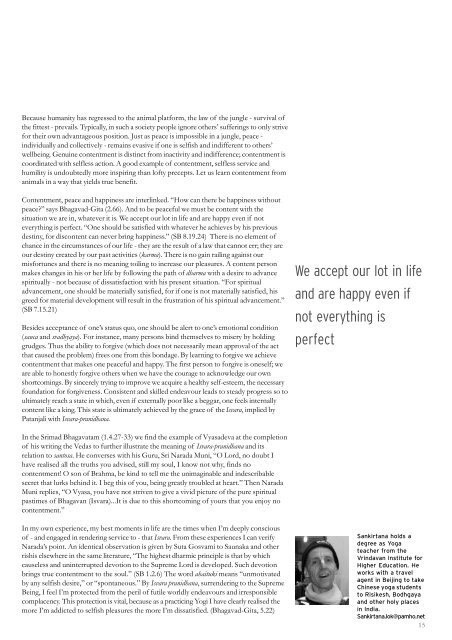Namaskar - Oct 09
Create successful ePaper yourself
Turn your PDF publications into a flip-book with our unique Google optimized e-Paper software.
Because humanity has regressed to the animal platform, the law of the jungle - survival of<br />
the fittest - prevails. Typically, in such a society people ignore others’ sufferings to only strive<br />
for their own advantageous position. Just as peace is impossible in a jungle, peace -<br />
individually and collectively - remains evasive if one is selfish and indifferent to others’<br />
wellbeing. Genuine contentment is distinct from inactivity and indifference; contentment is<br />
coordinated with selfless action. A good example of contentment, selfless service and<br />
humility is undoubtedly more inspiring than lofty precepts. Let us learn contentment from<br />
animals in a way that yields true benefit.<br />
Contentment, peace and happiness are interlinked. “How can there be happiness without<br />
peace?” says Bhagavad-Gita (2.66). And to be peaceful we must be content with the<br />
situation we are in, whatever it is. We accept our lot in life and are happy even if not<br />
everything is perfect. “One should be satisfied with whatever he achieves by his previous<br />
destiny, for discontent can never bring happiness.” (SB 8.19.24) There is no element of<br />
chance in the circumstances of our life - they are the result of a law that cannot err; they are<br />
our destiny created by our past activities (karma). There is no gain railing against our<br />
misfortunes and there is no meaning toiling to increase our pleasures. A content person<br />
makes changes in his or her life by following the path of dharma with a desire to advance<br />
spiritually - not because of dissatisfaction with his present situation. “For spiritual<br />
advancement, one should be materially satisfied, for if one is not materially satisfied, his<br />
greed for material development will result in the frustration of his spiritual advancement.”<br />
(SB 7.15.21)<br />
Besides acceptance of one’s status quo, one should be alert to one’s emotional condition<br />
(sauca and svadhyaya). For instance, many persons bind themselves to misery by holding<br />
grudges. Thus the ability to forgive (which does not necessarily mean approval of the act<br />
that caused the problem) frees one from this bondage. By learning to forgive we achieve<br />
contentment that makes one peaceful and happy. The first person to forgive is oneself; we<br />
are able to honestly forgive others when we have the courage to acknowledge our own<br />
shortcomings. By sincerely trying to improve we acquire a healthy self-esteem, the necessary<br />
foundation for forgiveness. Consistent and skilled endeavour leads to steady progress so to<br />
ultimately reach a state in which, even if externally poor like a beggar, one feels internally<br />
content like a king. This state is ultimately achieved by the grace of the Isvara, implied by<br />
Patanjali with Isvara-pranidhana.<br />
We accept our lot in life<br />
and are happy even if<br />
not everything is<br />
perfect<br />
In the Srimad Bhagavatam (1.4.27-33) we find the example of Vyasadeva at the completion<br />
of his writing the Vedas to further illustrate the meaning of Isvara-pranidhana and its<br />
relation to santosa. He converses with his Guru, Sri Narada Muni, “O Lord, no doubt I<br />
have realised all the truths you advised, still my soul, I know not why, finds no<br />
contentment! O son of Brahma, be kind to tell me the unimaginable and indescribable<br />
secret that lurks behind it. I beg this of you, being greatly troubled at heart.” Then Narada<br />
Muni replies, “O Vyasa, you have not striven to give a vivid picture of the pure spiritual<br />
pastimes of Bhagavan (Isvara)...It is due to this shortcoming of yours that you enjoy no<br />
contentment.”<br />
In my own experience, my best moments in life are the times when I’m deeply conscious<br />
of - and engaged in rendering service to - that Isvara. From these experiences I can verify<br />
Narada’s point. An identical observation is given by Suta Gosvami to Saunaka and other<br />
rishis elsewhere in the same literature, “The highest dharmic principle is that by which<br />
causeless and uninterrupted devotion to the Supreme Lord is developed. Such devotion<br />
brings true contentment to the soul.” (SB 1.2.6) The word ahaituki means “unmotivated<br />
by any selfish desire,” or “spontaneous.” By Isvara pranidhana, surrendering to the Supreme<br />
Being, I feel I’m protected from the peril of futile worldly endeavours and irresponsible<br />
complacency. This protection is vital, because as a practicing Yogi I have clearly realised the<br />
more I’m addicted to selfish pleasures the more I’m dissatisfied. (Bhagavad-Gita, 5.22)<br />
Sankirtana holds a<br />
degree as Yoga<br />
teacher from the<br />
Vrindavan Institute for<br />
Higher Education. He<br />
works with a travel<br />
agent in Beijing to take<br />
Chinese yoga students<br />
to Risikesh, Bodhgaya<br />
and other holy places<br />
in India.<br />
Sankirtana.lok@pamho.net<br />
15

















